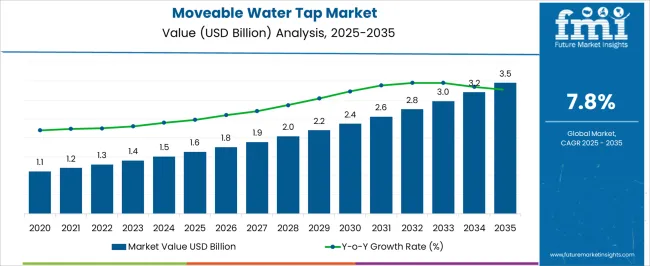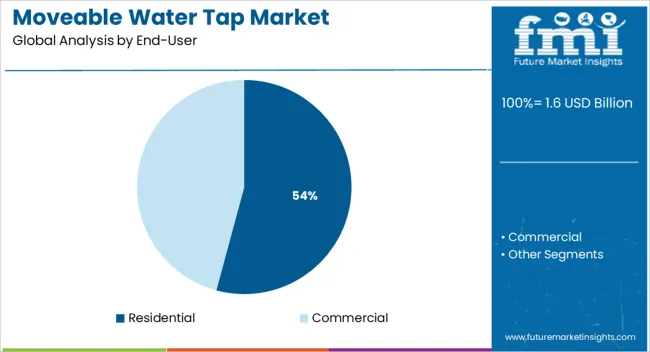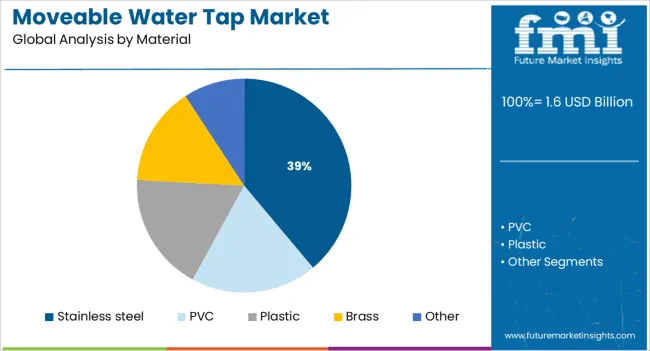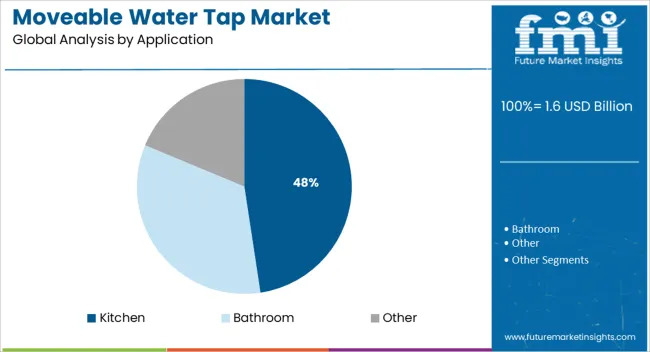The moveable water tap market is estimated to be valued at USD 1.6 billion in 2025 and is projected to reach USD 3.5 billion by 2035, registering a compound annual growth rate (CAGR) of 7.8% over the forecast period.
Between 2025 and 2030, the moveable water tap market will see strong adoption across residential applications, supported by rising urban housing projects and consumer preference for flexible, space-saving kitchen and bathroom solutions. North America and Europe will lead early adoption, as premium brands such as Kohler, GROHE, and Franke push design-led innovations and smart water control features. Asia-Pacific will begin to accelerate growth as urban middle-class households expand, with cost-competitive players like LIXIL and regional manufacturers scaling distribution. By 2030, the market is expected to cross the USD 2.5 billion mark, with residential installations accounting for more than half of total demand.
From 2030 to 2035, growth will shift toward broader mainstream adoption, driven by affordability improvements, e-commerce distribution, and sustainability-linked innovations such as water-saving nozzles and recyclable fittings. Asia-Pacific is projected to emerge as the largest growth contributor in this phase, reflecting both population scale and rapid construction activity. Meanwhile, commercial uptake, restaurants, hospitality, and modular offices, will grow faster than residential, expanding the overall demand base. Global leaders like DELTA Faucet Company and Quooker will invest in regional manufacturing and customization, while smaller players such as Gokul Poly Valves and Waterman strengthen low-cost supply. By 2035, the market will reach USD 3.5 billion, with a sustained CAGR of 7.8% and deeper penetration across both developed and emerging regions.
Industrial manufacturing environments implement moveable tap solutions for specialized cleaning procedures, equipment maintenance, and quality control processes that require water access at specific production line locations. Plant maintenance teams deploy portable tap systems for equipment washdown procedures in areas where permanent plumbing installation would interfere with production workflows or create contamination risks in sterile manufacturing environments. Semiconductor fabrication facilities utilize ultra-pure water delivery systems through moveable tap configurations that prevent contamination while providing precise flow control for sensitive cleaning applications.
Supply chain dynamics reflect specialization among manufacturers who develop tap systems optimized for specific applications including construction, food service, industrial, and emergency response markets. Component suppliers provide specialized fittings, hose assemblies, and flow control mechanisms designed for frequent connection and disconnection cycles without leakage or performance degradation. Quality control processes ensure equipment meets industry standards for pressure resistance, flow capacity, and materials compatibility across different water quality conditions.
Moveable Water Tap Market

| Metric | Value |
|---|---|
| Moveable Water Tap Market Estimated Value in (2025 E) | USD 1.6 billion |
| Moveable Water Tap Market Forecast Value in (2035 F) | USD 3.5 billion |
| Forecast CAGR (2025 to 2035) | 7.8% |
The moveable water tap market is experiencing sustained expansion, propelled by the global shift toward modular kitchen and bathroom designs and the increasing consumer preference for flexible plumbing systems. Enhanced convenience, water-saving mechanisms, and smart integration capabilities are among the factors influencing adoption. Demand is being further driven by heightened awareness of hygiene, increased renovation activities in residential settings, and innovations in tap architecture to support user mobility and multifunctionality.
The market is benefiting from advancements in material science, ergonomic design enhancements, and easy-to-install plumbing systems tailored to urban households. The use of moveable mechanisms supported by rotatable spouts and pull-down features has allowed users to control water flow with greater precision.
As residential consumers increasingly prioritize utility, style, and performance, manufacturers are responding with products that offer smart compatibility, leak prevention, and long service life Over the forecast period, rising urbanization and a growing inclination toward DIY home improvements are expected to further stimulate demand for moveable water taps in both developed and emerging regions.
The market is segmented by End-User, Material, Application, and Distribution Channel and region. Regionally, the market is classified into North America, Latin America, Western Europe, Eastern Europe, Balkan & Baltic Countries, Russia & Belarus, Central Asia, East Asia, South Asia & Pacific, and the Middle East & Africa.

The residential segment is expected to account for 54.2% of the total revenue share in the moveable water tap market in 2025, establishing its dominance across all end-user categories. The growth of this segment is being shaped by the rising trend of home improvement projects and the increasing emphasis on personalized and efficient water dispensing systems within households. Moveable taps are being widely adopted in residential kitchens and bathrooms for their ability to enhance user experience through adjustable spray modes and multi-directional control.
The adoption rate has been supported by consumer demand for visually appealing yet functional fixtures that complement interior aesthetics. Furthermore, the availability of compact and wall-mountable models tailored to small urban kitchens has expanded the customer base in space-constrained housing.
Rising income levels, awareness around water conservation, and the integration of taps with filtration systems have added to the demand in this segment The flexibility and user-centric design of moveable water taps continue to make them a preferred choice in modern residential environments.

Stainless steel is projected to hold 38.9% of the moveable water tap market revenue share in 2025, emerging as the most preferred material in tap manufacturing. The segment’s leadership is being driven by the material’s corrosion resistance, durability, and sleek appearance, which aligns well with both traditional and contemporary kitchen and bathroom aesthetics. Stainless steel has been recognized for its non-toxic, lead-free properties, making it suitable for potable water applications and appealing to health-conscious consumers.
Manufacturers have increasingly opted for stainless steel in moveable taps due to its strength, thermal resistance, and ease of fabrication into complex designs such as extendable arms and flexible spouts. The material's long service life and low maintenance requirements have also contributed to its adoption in high-usage environments.
In addition, its compatibility with various surface finishes and matte textures has enhanced its market appeal among style-driven consumers Environmental sustainability considerations and growing demand for recyclable materials have further strengthened stainless steel’s position in this segment.

The kitchen segment is anticipated to capture 47.6% of the moveable water tap market revenue share in 2025, reflecting its central role in driving application-based demand. Growth in this segment is being influenced by the increasing focus on kitchen ergonomics, hygiene, and multi-functional fixtures that simplify daily cooking and cleaning tasks. Moveable water taps have found widespread acceptance in modern kitchens for their extendable reach, swivel capabilities, and precision control, enabling users to manage water flow across sinks of varying sizes.
The surge in modular kitchen installations, along with growing consumer interest in home automation and efficient water use, has reinforced demand in this segment. Enhanced compatibility with under-sink filtration units and dishwashers has further expanded usage scenarios.
The increasing adoption of smart faucets with touch or sensor controls in residential and semi-commercial kitchens has contributed to segment growth As households continue to prioritize utility without compromising aesthetics, kitchen-focused moveable taps are expected to see sustained traction in both new construction and renovation markets.
Customers' preference for an urban lifestyle has fueled market growth. Furthermore, the customer's improving lifestyle, shifting preferences, and widening disposable income have increased spending on luxury homes and remodeling.
This encourages manufacturers to produce elevated bathroom and kitchen apparel. This shift in lifestyle and urbanization will have a positive impact on the demand for mobile faucets.
Furthermore, many participants are investing in Research and Development (R&D) to deliver the best quality and appearance of tap to the customer. HASDING, for example, introduced a 360° rotatable anti-splash sink faucet with three modes.
The high-performance tap extender makes it simple to modify the water outlet mode. Soft Stream Bubble, Shower Mode, and Shower Pulse are three modes that provide more options for conserving water. Such tap features entice customers to select such faucets that save water and promote sales in the water scarcity area.
The most technologically advanced generations are thought to be the youngest ones. Because these generations have witnessed several technological advancements, millennials expect firms to supply a greater choice of accessories. The younger generation is captivated by smart products.
Millennials are the generation most interested in having smart technology in their bathroom and kitchen. The introduction of the sensor-based movable bathroom and kitchen tap, with an aim of water conservation and ensuring proper hygiene in the washing area, is happily accepted by the people of North America.
Furthermore, with the fast-changing lifestyle and urbanization, the possessions of houses are also growing in the United States and Canada, this factor has required the installation of the tap in the bathroom and kitchen. And people of the region know the benefits of the moveable taps like this type of taps save water, also cleaning is easy with these taps.
Thus, the business of the moving tap is rising in the region. Moreover, the remodeling and repairing of house utility areas including bathrooms and kitchens have generated a fair demand for movable water faucets in the region. North America is accounting for a market share of 29.4% of the global moveable water tap market.
Amid the COVID-19 outbreak, the moveable water tap market has faced extensive growth challenges, due to store closures across different regions of Europe. Besides this, the consumers’ shift from retail stores to online buying has opened new sales opportunities for online retailers in the market. While during the forecast period, the movable water faucet demand remains fragmented with the presence and entering of a large number of key players in the market in Europe.
Many key players in the market are providing unique looks, styles, and designs for faucets. Many pro players are also having skilled labor to manufacture and design products, which helps the player to strengthen their presence in European countries.
Furthermore, many players supply their movable water taps through their distribution channels. Moreover, to maintain good relations with customers, players are providing advisory and technical services along with a warranty to their consumers. This helps the players to gain competitive advantages in the market in Europe.
Moreover, the changing lifestyle has a renovated kitchen as a place for family and friends to gather rather than a place for just cooking. This change is attributed to the increasing demand for sophisticated, elegant, and multifunctional kitchen taps.
For instance, Franke Kitchen Systems introduce a tap equipped with the ability to swivel 360 degrees and switch between full and needle water spray. Europe is accounting for a market share of 23.4% of the global moveable water tap market in 2025.
Also, its 3-in-1 tap is manufactured to give cold, hot, and distilled water to provide all types of water for kitchen purposes. Such innovation gives the idea to other players to launch such type of tap to gain a competitive advantage in the market.
Commercial and Residential Segments that Likely to Augment Moveable Water Tap Sales
Significant expansion in commercial places including hospitals, restaurants, hotels, shopping complexes, railway stations, airports, and utility areas is expected to drive the market demand for movable water faucets during the forecast period. For instance, Delta Faucet Company offers innovative commercial taps for various sectors.
The ShieldSpray® Technology of the company cleans like laser precision while containing splatter ad mess. A pressurized jet present in the protective sphere powers away the stubborn messes with almost 90% less splatter than a traditional spray so people can spend minimum time soaking, shirt swapping, and scrubbing.
Furthermore, in the residential sector, the market for the moveable tap is growing because people depend on premium bathroom and kitchen accessories that complement the interiors as well as survey the purpose. Also, the sales of water taps are increased with the increasing number of households.
The moveable water tap market is driven by global plumbing and kitchen fixture manufacturers emphasizing functionality, design flexibility, and sustainability. Franke Home Solutions and Kohler Co. lead the segment with premium movable and pull-out tap systems integrating ergonomic design, water-saving technologies, and durable finishes for residential and commercial kitchens. Gerber Plumbing Fixtures LLC and Delta Faucet Company offer versatile tap solutions featuring swivel spouts, touchless operation, and temperature control, catering to growing consumer demand for convenience and hygiene.
Meon Incorporated and Quooker Hong Kong Ltd. focus on innovative, multifunctional water systems, including instant hot and filtered water taps designed for compact, energy-efficient kitchen environments. GROHE and LIXIL Corporation dominate the European and Asian markets respectively, offering high-quality movable taps with smart water control features and sustainable flow management systems that align with global water conservation initiatives. Gokul Poly Valves Pvt. Ltd. contributes to the market with cost-effective and durable plastic and polymer-based movable tap solutions, serving both residential and industrial sectors in emerging markets.
| Report Attribute | Details |
|---|---|
| Growth Rate | CAGR of 7.8% from 2025 to 2035 |
| Market Value in 2025 | USD 1.6 billion |
| Market Value in 2035 | USD 3.5 billion |
| Base Year for Estimates | 2024 |
| Historical Data | 2020 to 2024 |
| Forecast Period | 2025 to 2035 |
| Quantitative Units | Revenue in USD Million and CAGR from 2025 to 2035 |
| Report Coverage | Revenue Forecast, Company Ranking, Competitive Landscape, Growth Factors, Trends, and Pricing Analysis |
| Segments Covered | End User, Material, Application, Distribution Channels, Region |
| Regions Covered | North America; Latin America; Europe; Asia Pacific; Middle East and Africa |
| Key Countries Profiled | The USA, Canada, Brazil, Mexico, Germany, The United Kingdom, France, Spain, Italy, China, Japan, South Korea, Singapore, Thailand, Indonesia, Australia, New Zealand, GCC, South Africa,Israel |
| Key Companies Profiled | Franke Home Solutions, Kohler Co., Gerber Plumbing Fixtures LLC, Delta Faucet Company, Meon Incorporated, Quooker Hong Kong Ltd., GROHE, LIXIL Corporation, and Gokul Poly Valves Pvt. Ltd. |
| Report Customization & Pricing | Available upon Request |
The global moveable water tap market is estimated to be valued at USD 1.6 billion in 2025.
The market size for the moveable water tap market is projected to reach USD 3.5 billion by 2035.
The moveable water tap market is expected to grow at a 7.8% CAGR between 2025 and 2035.
The key product types in moveable water tap market are residential and commercial.
In terms of material, stainless steel segment to command 38.9% share in the moveable water tap market in 2025.






Our Research Products

The "Full Research Suite" delivers actionable market intel, deep dives on markets or technologies, so clients act faster, cut risk, and unlock growth.

The Leaderboard benchmarks and ranks top vendors, classifying them as Established Leaders, Leading Challengers, or Disruptors & Challengers.

Locates where complements amplify value and substitutes erode it, forecasting net impact by horizon

We deliver granular, decision-grade intel: market sizing, 5-year forecasts, pricing, adoption, usage, revenue, and operational KPIs—plus competitor tracking, regulation, and value chains—across 60 countries broadly.

Spot the shifts before they hit your P&L. We track inflection points, adoption curves, pricing moves, and ecosystem plays to show where demand is heading, why it is changing, and what to do next across high-growth markets and disruptive tech

Real-time reads of user behavior. We track shifting priorities, perceptions of today’s and next-gen services, and provider experience, then pace how fast tech moves from trial to adoption, blending buyer, consumer, and channel inputs with social signals (#WhySwitch, #UX).

Partner with our analyst team to build a custom report designed around your business priorities. From analysing market trends to assessing competitors or crafting bespoke datasets, we tailor insights to your needs.
Supplier Intelligence
Discovery & Profiling
Capacity & Footprint
Performance & Risk
Compliance & Governance
Commercial Readiness
Who Supplies Whom
Scorecards & Shortlists
Playbooks & Docs
Category Intelligence
Definition & Scope
Demand & Use Cases
Cost Drivers
Market Structure
Supply Chain Map
Trade & Policy
Operating Norms
Deliverables
Buyer Intelligence
Account Basics
Spend & Scope
Procurement Model
Vendor Requirements
Terms & Policies
Entry Strategy
Pain Points & Triggers
Outputs
Pricing Analysis
Benchmarks
Trends
Should-Cost
Indexation
Landed Cost
Commercial Terms
Deliverables
Brand Analysis
Positioning & Value Prop
Share & Presence
Customer Evidence
Go-to-Market
Digital & Reputation
Compliance & Trust
KPIs & Gaps
Outputs
Full Research Suite comprises of:
Market outlook & trends analysis
Interviews & case studies
Strategic recommendations
Vendor profiles & capabilities analysis
5-year forecasts
8 regions and 60+ country-level data splits
Market segment data splits
12 months of continuous data updates
DELIVERED AS:
PDF EXCEL ONLINE
Water Vapor Permeability Analyzers Market Size and Share Forecast Outlook 2025 to 2035
Water and Waste Water Treatment Chemical Market Size and Share Forecast Outlook 2025 to 2035
Water-cooled Walk-in Temperature & Humidity Chamber Market Size and Share Forecast Outlook 2025 to 2035
Waterless Bathing Solution Market Size and Share Forecast Outlook 2025 to 2035
Water Treatment System Market Size and Share Forecast Outlook 2025 to 2035
Waterborne UV Curable Resin Market Size and Share Forecast Outlook 2025 to 2035
Water Treatment Chemical Market Size and Share Forecast Outlook 2025 to 2035
Water Adventure Tourism Market Forecast and Outlook 2025 to 2035
Water Packaging Market Forecast and Outlook 2025 to 2035
Water Soluble Bag Market Size and Share Forecast Outlook 2025 to 2035
Water Leak Sensors Market Size and Share Forecast Outlook 2025 to 2035
Water-soluble Packaging Market Size and Share Forecast Outlook 2025 to 2035
Water Leak Detection System for Server Rooms and Data Centers Market Size and Share Forecast Outlook 2025 to 2035
Water and Wastewater Treatment Equipment Market Size and Share Forecast Outlook 2025 to 2035
Water Treatment Market Size and Share Forecast Outlook 2025 to 2035
Water Underfloor Heating Thermostat Market Size and Share Forecast Outlook 2025 to 2035
Water Activity Meter Market Size and Share Forecast Outlook 2025 to 2035
Water Leakage Tester Market Size and Share Forecast Outlook 2025 to 2035
Waterstops Market Size and Share Forecast Outlook 2025 to 2035
Water-miscible Metalworking Oil Market Size and Share Forecast Outlook 2025 to 2035

Thank you!
You will receive an email from our Business Development Manager. Please be sure to check your SPAM/JUNK folder too.
Chat With
MaRIA